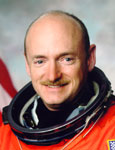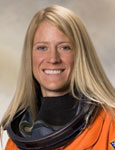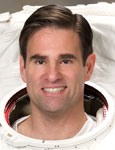This is an archive of information released in the past.
Disclaimer: It may contain broken links or outdated information. Some parts may not function in current web browsers.
*Visit https://humans-in-space.jaxa.jp/en/ for the latest information.

Mission
1J Mission
STS-124 Mission (1J)

1J Mission Insignia (official JAXA mission patches for the 1J Mission)
The STS-124 Mission (1J), the second of the three Kibo designated assembly missions, delivered and assembled Kibo’s main experiment module, the “Pressurized Module (PM),” also known as JPM, and Kibo’s robotic arm, the “Remote Manipulator System (JEMRMS),” to the ISS.
The PM is Kibo’s central facility where Kibo’s core systems and experiments are installed and operated.
JAXA astronaut Akihiko Hoshide flew to the ISS aboard the space shuttle Discovery as a Mission Specialist (MS).
Assembly of Kibo pressurized facilities was completed during the STS-124 Mission, and at this point, the half of the Kibo complex was accomplished and the Kibo facilities became fully operational like the other ISS modules.
The STS-124 Mission achieved some of the most significant milestones in JAXA’s Japanese Experiment Module (JEM) Project: Installation and activation of the PM, crew ingress , rack transfer, rack deployment, full deployment of the JEMRMS and relocation of the ELM-PS. The ELM-PS, which was delivered to the ISS on the preceding mission (STS-123), was relocated from the temporary location on the Harmony (Node 2) to its final position, the zenith side of the PM.
While the PM and JEMRMS were launched aboard the space shuttle, the JEMRMS was firmly attached to the side of the PM (this is the position from which the JEMRMS will operate). After the PM installation, the JEMRMS was activated and deployed. The JEMRMS was translated into its stow position after its brake tests.
For details of Kibo, please refer to Kibo HANDBOOK [PDF: 6.1MB].
| Launch date | 5:02 p.m. May 31, 2008 (EDT) 6:02 a.m. June 1, 2008 (JST) |
|---|---|
| Launch site | NASA Kennedy Space Center (KSC) |
| Docking date | 1:03 p.m. June 2, 2008 (CDT) 3:03 a.m. June 3, 2008 (JST) |
| Undocking date | 6:42 a.m. June 11, 2008 (CDT) 8:42 p.m. June 11, 2008 (JST) |
| Duration | 13 days 18 hours and 13 minutes |
| Crew | Seven (including JAXA astronaut Akihiko Hoshide and a rotation crew member for Expedition 17) |
| Orbiter | Discovery(35th flight) |
| Altitude | Orbital Insertion: approx. 226km Docking: approx. 343km |
| Inclination | 51.6 Degrees |
| Landing date | 11:15 a.m. June 14, 2008 (EDT) 0:15 a.m. June 15, 2008 (JST) |
| Landing Site | NASA Kennedy Space Center (KSC) |
| Main payload | Pressurized Module (PM) and Remote Manipulator System (JEMRMS) |
-
In the ISS assembly flight mission designators, the "J" represents the missions relating to Japanese elements. For example, "1J" is the first Japanese assembly mission, which will deliver and assemble Japanese elements to the ISS.
Figure 2 depicts the ISS configuration after the STS-124 Mission (1J) is completed.

ISS configuration after STS-124
Crew
 Mark E. Kelly Commander NASA Astronaut Biographies |

Kenneth T. Ham Pilot NASA Astronaut Biographies |

Karen L. Nyberg Mission Specialist NASA Astronaut Biographies |

Ronald J. Garan Mission Specialist NASA Astronaut Biographies |

Michael E. Fossum Mission Specialist NASA Astronaut Biographies |

Akihiko Hoshide Mission Specialist NASA Astronaut Biographies |

Gregory Errol Chamitoff ISS Expedition 17 Flight Engineer NASA Astronaut Biographies |

Garrett E. Reisman ISS Expedition 17 Flight Engineer NASA Astronaut Biographies |
Image credit: NASA
NASA Astronaut Biographies on the official NASA website
http://www.jsc.nasa.gov/Bios/astrobio_activemgmt.html
| Copyright 2007 Japan Aerospace Exploration Agency | Site Policy |